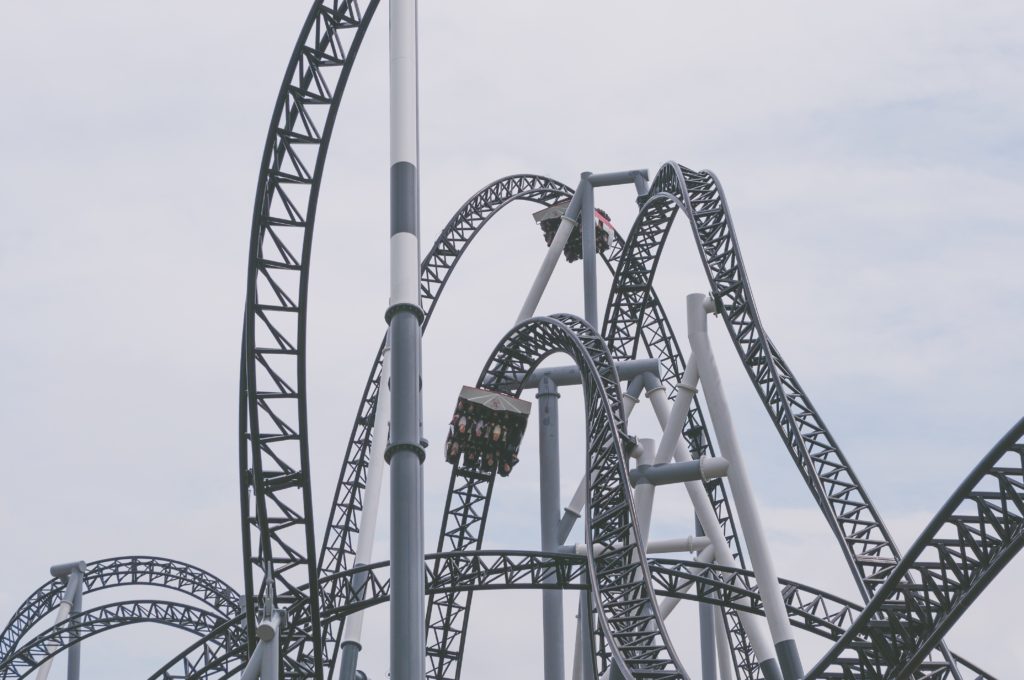flash fiction by Brigid Ives
I remember when I thought that racing down backroads was dangerous. Maybe it was my years living in the city that made the winds and curves seem like a rollercoaster ride—your heart racing at the ever-present possibility of going off the tracks. It took years for me to glance down at my speedometer and notice that I was going above the speed limit, expecting the next move before it came.
Familiarity came gradually, over time. The same way you learn a person’s body, where one day, when you’re both comfortable with total nudity, you find yourself not staring, not feeling surprised by their physiology.
Sometimes, when I lay in the bathtub, I feel unmanageable. It takes a while of marinating in what has surely become dirty water to really look and see your body. My earliest memories consist of the intimate relationship I had with my parents’ physical forms. I could tell you where their freckles landed on the back of their thighs, how their ears fit into their heads. I remember thinking that they were too much—too big, too much skin, too many pieces and parts that they couldn’t even see. I enjoyed the feeling of being compact, of knowing where everything was. When’s the last time I’ve really looked at my pinky toe, anyway?

I find it hard not to think about him. And then I think about myself thinking about him. “Cut yourself a break,” my Mom used to say, “your brain is too busy.” Isn’t everyone’s brain busy? Can anyone’s head really stay silent? These are the kind of things I’ve find myself spewing to my therapist. They’re all collected in a bucket like rainwater for her to reply with just one seemingly thoughtful response—“I think you’re asking the wrong questions.” Which, as it turns out, isn’t an answer.
Forgiving myself. That’s what I’m trying to do. Forgive myself. It’s no one’s fault. There’s no one to blame. But we all know there’s always someone to blame. I genuinely believe that all feelings need a target. Anger, love, loss, blame, dreams don’t just dry up like a raisin in the sun (they all definitely explode).
The same way you learn a person’s body, where one day, when you’re both comfortable with total nudity, you find yourself not staring, not feeling surprised by their physiology.
What I want to know is, when you pass people on the street, or have a brief interaction with a person in some commonplace location, do you fill in the blanks? I always do. I’m not sure if it’s because that helps me treat them like a person. Susan at the Deli married her high school sweetheart and he’s never cheated but she has, just once, ten years ago. They worked through it for the sake of their son. Jon, the mailman, has a passion for sci fi novels and ramen noodles, which is why he named his most recent cat Ishiguro, which he mispronounces purposefully when repeating it to women—their eligibility ultimately hanging on a correction.
Maybe this is why I work at the National Park. As people drive in, I can put down my book and take a peak into their lives. Otherwise, it’s peaceful (read: solitary). I’m alone with my thoughts on the drive back. “Just turn on the radio,” my mom advised. She’s excellent at minimizing.
“I don’t think it’s good for your psyche to drive that road every day.” Au contraire, it’s the only way for me to maintain any psyche at all, I tell my therapist. “You must feel forced to relive it. I think you’ve done your penance.”

The memory is like a cheap piece of gum you’ve put in your mouth five hours ago. It’s disgusting and falling apart and been stretched and pulled every which way. Worn. It’s worn. You’ve tried a million different ways—a million different combinations. It always ends up the same way. You never make any progress.
Was I looking down at my phone? Or was that the moment before? Would I feel better or worse had I been responding to a text message? Does the truth even matter at this point? It was a summer job, and I remember the playlist I’d selected for my evening drive home: “Summer 2k17 Jamz.” They say that, during incidents of trauma, you recall the tiniest of details. And once we’d made contact, everything seemed to go in slow motion.
Jon, the mailman, has a passion for sci fi novels and ramen noodles, which is why he named his most recent cat Ishiguro, which he mispronounces purposefully when repeating it to women—their eligibility ultimately hanging on a correction.
I never saw him—inside the car, I mean. I didn’t see what his face looked in his last moments, I couldn’t discern whether he knew what was about to befall him. I didn’t see the car flip, and it took a few minutes after we made contact for me to come to. It’s a weird combination of feeling frantic and calm. It’s as if there’s so much that you need to do but nothing that can be done. The still of the night matched by the cacophony of bugs, frogs, owls.
In my most dramatic moments, I want to cry and take responsibility—take the blame—for the life I took. A life that I had the inability to mourn. It seemed uncouth to attend the funeral. His family wouldn’t feel appeased by an apology. I wasn’t drunk, I wasn’t asleep. It was an accident. That’s what everyone says—it was an accident.
The English language—no, all language—is so painfully imprecise. In those most profound moments of feeling, words are so inadequate to express what’s going on behind the scenes. Take the word accident, for instance. Accident provokes images of spilled milk, a skinned knee, coloring outside of the lines, a fender bender, a wet bed. You don’t think ambulance, police investigation, body bag, shouts of rage, flares lighting the night.
When I meet new people, I want to confess. I’m a murderer. It was me. And then here I am, back at the start of the circle, angry that I’m still thinking and worrying about me. How this whole incident reflects on me. What about them? What about him? How can I ever possibly fix this?
I imagine myself laying in bed one night, beside a new lover, staring at the ceiling and sharing this story again. Re-telling, reliving. Feeling the person beside me soaking up the details, formulating questions, processing, processing. I can hear it underneath my words. They’re probably wondering if this is something they can live with—living with me like this. They’re lucky that they have a choice.
How many bodies have you really known—including your own? Roommates’, maybe. Siblings. There’s a comfort that comes with knowing the shape of someone’s fingernails, how the hair runs down the back of their neck, their ankle bone. You can press the gas pedal a bit harder.
